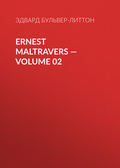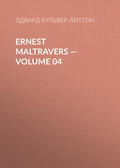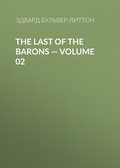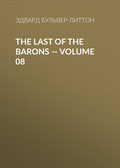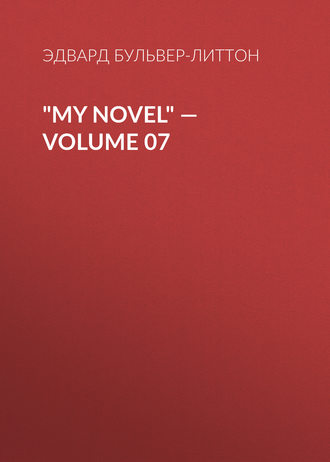
Эдвард Бульвер-Литтон
"My Novel" — Volume 07
"Mother," said the soldier, simply, "when the land was in danger I served it as my forefathers served,—and my answer would be the scars on my breast."
"Is it only in danger that a country is served, only in war that duty is fulfilled? Do you think that your father, in his plain, manly life of country gentleman, does not fulfil, though perhaps too obscurely, the objects for which aristocracy is created, and wealth is bestowed?"
"Doubtless he does, ma'am,—and better than his vagrant son ever can."
"Yet his vagrant son has received such gifts from nature, his youth was so rich in promise, his boyhood so glowed at the dream of glory!"
"Ay," said Harley, very softly, "it is possible,—and all to be buried in a single grave!"
The countess started, and withdrew her hand from Harley's shoulder.
Lady Lansmere's countenance was not one that much varied in expression. She had in this, as in her cast of feature, little resemblance to her son.
Her features were slightly aquiline,—the eyebrows of that arch which gives a certain majesty to the aspect; the lines round the mouth were habitually rigid and compressed. Her face was that of one who had gone through great emotion and subdued it. There was something formal, and even ascetic, in the character of her beauty, which was still considerable, in her air and in her dress. She might have suggested to you the idea of some Gothic baroness of old, half chatelaine, half- abbess; you would see at a glance that she did not live in the light world around her, and disdained its fashion and its mode of thought; yet with all this rigidity it was still the face of the woman who has known human ties and human affections. And now, as she gazed long on Harley's quiet, saddened brow, it was the face of a mother.
"A single grave," she said, after a long pause. "And you were then but a boy, Harley! Can such a memory influence you even to this day? It is scarcely possible: it does not seem to me within the realities of man's life,—though it might be of woman's."
"I believe," said Harley, half soliloquizing, "that I have a great deal of the woman in me. Perhaps men who live much alone, and care not for men's objects, do grow tenacious of impressions, as your sex does. But oh," he cried, aloud, and with a sudden change of countenance, "oh, the hardest and the coldest man would have felt as I do, had he known HER, had he loved HER. She was like no other woman I have ever met. Bright and glorious creature of another sphere! She descended on this earth and darkened it when she passed away. It is no use striving. Mother, I have as much courage as our steel-clad fathers ever had. I have dared in battle and in deserts, against man and the wild beast, against the storm and the ocean, against the rude powers of Nature,—dangers as dread as ever pilgrim or Crusader rejoiced to brave. But courage against that one memory! no, I have none!"
"Harley, Harley, you break my heart!" cried the countess, clasping her hands.
"It is astonishing," continued her son, so rapt in his own thoughts that he did not, perhaps, hear her outcry. "Yea, verily, it is astonishing, that considering the thousands of women I have seen and spoken with, I never see a face like hers,—never hear a voice so sweet. And all this universe of life cannot afford me one look and one tone that can restore me to man's privilege,—love. Well, well, well, life has other things yet; Poetry and Art live still; still smiles the heaven and still wave the trees. Leave me to happiness in my own way."
The countess was about to reply, when the door was thrown hastily open, and Lord Lansmere walked in.
The earl was some years older than the countess, but his placid face showed less wear and tear,—a benevolent, kindly face, without any evidence of commanding intellect, but with no lack of sense in its pleasant lines; his form not tall, but upright and with an air of consequence,—a little pompous, but good-humouredly so,—the pomposity of the Grand Seigneur who has lived much in provinces, whose will has been rarely disputed, and whose importance has been so felt and acknowledged as to react insensibly on himself;—an excellent man; but when you glanced towards the high brow and dark eye of the countess, you marvelled a little how the two had come together, and, according to common report, lived so happily in the union.
"Ho, ho! my dear Harley," cried Lord Lansmere, rubbing his hands with an appearance of much satisfaction, "I have just been paying a visit to the duchess."
"What duchess, my dear father?"
"Why, your mother's first cousin, to be sure,—the Duchess of Knaresborough, whom, to oblige me, you condescended to call upon; and delighted I am to hear that you admire Lady Mary—"
She is very high bred, and rather—high-nosed," answered Harley. Then, observing that his mother looked pained, and his father disconcerted, he added seriously, "But handsome certainly."
"Well, Harley," said the earl, recovering himself, "the duchess, taking advantage of our connection to speak freely, has intimated to me that Lady Mary has been no less struck with yourself; and to come to the point, since you allow that it is time you should think of marrying, I do not know a more desirable alliance. What do you say, Katherine?"
"The duke is of a family that ranks in history before the Wars of the Roses," said Lady Lansmere, with an air of deference to her husband; "and there has never been one scandal in its annals, nor one blot on its scutcheon. But I am sure my dear Lord must think that the duchess should not have made the first overture,—even to a friend and a kinsman?"
"Why, we are old-fashioned people," said the earl, rather embarrassed, "and the duchess is a woman of the world."
"Let us hope," said the countess, mildly, "that her daughter is not."
"I would not marry Lady Mary, if all the rest of the female sex were turned into apes," said Lord L'Estrange, with deliberate fervour.
"Good heavens!" cried the earl, "what extraordinary language is this?
And pray why, sir?"
HARLEY.—"I can't say; there is no why in these cases. But, my dear father, you are not keeping faith with me."
LORD LANSMERE.—"HOW?"
HARLEY.—"You and my Lady, here, entreat me to marry; I promise to do my best to obey you, but on one condition, that I choose for myself, and take my time about it. Agreed on both sides. Whereon, off goes your Lordship—actually before noon, at an hour when no lady, without a shudder, could think of cold blonde and damp orange flowers—off goes your Lordship, I say, and commits poor Lady Mary and your unworthy son to a mutual admiration,—which neither of us ever felt. Pardon me, my father, but this is grave. Again let me claim your promise,—full choice for myself, and no reference to the Wars of the Roses. What War of the Roses like that between Modesty and Love upon the cheek of the virgin!"
LADY LANSMERE.—"Full choice for yourself, Harley: so be it. But we, too, named a condition,—did we not, Lansmere?"
THE EARL (puzzled).—"Eh, did we? Certainly we did."
HARLEY.—"What was it?"
LADY LANSMERE.—"The son of Lord Lansmere can only marry the daughter of a gentleman."
THE EARL.—-"Of course, of course."
The blood rushed over Harley's fair face, and then as suddenly left it pale.
He walked away to the window; his mother followed him, and again laid her hand on his shoulder.
"You were cruel," said he, gently, and in a whisper, as he winced under the touch of the hand. Then turning to the earl, who was gazing at him in blank surprise,—it never occurred to Lord Lansmere that there could be a doubt of his son's marrying beneath the rank modestly stated by the countess,—Harley stretched forth his hand, and said, in his soft winning tone, "You have ever been most gracious to me, and most forbearing; it is but just that I should sacrifice the habits of an egotist, to gratify a wish which you so warmly entertain. I agree with you, too, that our race should not close in me,—Noblesse oblige. But you know I was ever romantic; and I must love where I marry; or, if not love, I must feel that my wife is worthy of all the love I could once have bestowed. Now, as to the vague word 'gentleman' that my mother employs—word that means so differently on different lips—I confess that I have a prejudice against young ladies brought up in the 'excellent foppery of the world,' as the daughters of gentlemen of our rank mostly are. I crave, therefore, the most liberal interpretation of this word 'gentleman.' And so long as there be nothing mean or sordid in the birth, habits, and education of the father of this bride to be, I trust you will both agree to demand nothing more,—neither titles nor pedigree."
"Titles, no, assuredly," said Lady Lansmere; "they do not make gentlemen."
"Certainly not," said the earl; "many of our best families are untitled."
"Titles—no," repeated Lady Lansmere; "but ancestors yes."
"Ah, my mother," said Harley, with his most sad and quiet smile, "it is fated that we shall never agree. The first of our race is ever the one we are most proud of; and pray, what ancestors had he? Beauty, virtue, modesty, intellect,—if these are not nobility enough for a man, he is a slave to the dead."
With these words Harley took up his hat and made towards the door.
"You said yourself, 'Noblesse oblige,'" said the countess, following him to the threshold; "we have nothing more to add."
Harley slightly shrugged his shoulders, kissed his mother's hand; whistled to Nero, who started up from a doze by the window, and went his way.
"Does he really go abroad next week?" said the earl. "So he says."
"I am afraid there is no chance for Lady Mary," resumed Lord Lansmere, with a slight but melancholy smile.
"She has not intellect enough to charm him. She is not worthy of Harley," said the proud mother.
"Between you and me," rejoined the earl, rather timidly, "I don't see what good his intellect does him. He could not be more unsettled and useless if he were the merest dunce in the three kingdoms. And so ambitious as he was when a boy! Katherine, I sometimes fancy that you know what changed him."
"I!" Nay, my dear Lord, it is a common change enough with the young, when of such fortunes, who find, when they enter life, that there is really little left for them to strive for. Had Harley been a poor man's son, it might have been different."
"I was born to the same fortunes as Harley," said the earl, shrewdly, "and yet I flatter myself I am of some use to old England."
The countess seized upon the occasion, complimented her Lord, and turned the subject.
CHAPTER XVII
Harley spent his day in his usual desultory, lounging manner,—dined in his quiet corner at his favourite club. Nero, not admitted into the club, patiently waited for him outside the door. The dinner over, dog and man, equally indifferent to the crowd, sauntered down that thoroughfare which, to the few who can comprehend the Poetry of London, has associations of glory and of woe sublime as any that the ruins of the dead elder world can furnish,—thoroughfare that traverses what was once the courtyard of Whitehall, having to its left the site of the palace that lodged the royalty of Scotland; gains, through a narrow strait, that old isle of Thorney, in which Edward the Confessor received the ominous visit of the Conqueror; and, widening once more by the Abbey and the Hall of Westminster, then loses itself, like all memories of earthly grandeur, amidst humble passages and mean defiles.
Thus thought Harley L'Estrange—ever less amidst the actual world around him than the images invoked by his own solitary soul-as he gained the bridge, and saw the dull, lifeless craft sleeping on the "Silent Way," once loud and glittering with the gilded barks of the antique Seignorie of England.
It was on that bridge that Audley Egerton had appointed to meet L'Estrange, at an hour when he calculated he could best steal a respite from debate. For Harley, with his fastidious dislike to all the resorts of his equals, had declined to seek his friend in the crowded regions of Bellamy's.
Harley's eye, as he passed along the bridge, was attracted by a still form, seated on the stones in one of the nooks, with its face covered by its hands. "If I were a sculptor," said he to himself, "I should remember that image whenever I wished to convey the idea of Despondency!" He lifted his looks and saw, a little before him in the midst of the causeway, the firm, erect figure of Audley Egerton. The moonlight was full on the bronzed countenance of the strong public man, with its lines of thought and care, and its vigorous but cold expression of intense self-control.
"And looking yonder," continued Harley's soliloquy, "I should remember that form, when I wished to hew out from the granite the idea of Endurance."
"So you are come, and punctually," said Egerton, linking his arm in Harley's.
HARLEY—"Punctually, of course, for I respect your time, and I will not detain you long. I presume you will speak to-night?"
EGERTON.—"I have spoken."
HARLEY (with interest).—"And well, I hope?"
EGERTON.—" With effect, I suppose, for I have been loudly cheered, which does not always happen to me."
HARLEY.—"And that gave you pleasure?"
EGERTON (after a moment's thought).—"No, not the least."
HARLEY.—"What, then, attaches you so much to this life,—constant drudgery, constant warfare, the more pleasurable faculties dormant, all the harsher ones aroused, if even its rewards (and I take the best of those to be applause) do not please you?"
EGERTON.—"What? Custom."
HARLEY.—"Martyr."
EGERTON.—"You say it: but turn to yourself; you have decided, then, to leave England next week?"
HARLEY (moodily).—-"Yes. This life in a capital, where all are so active, myself so objectless, preys on me like a low fever. Nothing here amuses me, nothing interests, nothing comforts and consoles. But I am resolved, before it be too late, to make one great struggle out of the Past, and into the natural world of men. In a word, I have resolved to marry."
EGERTON.—" Whom?"
HARLEY (seriously).—" Upon my life, my dear fellow, you are a great philosopher. You have hit the exact question. You see I cannot marry a dream; and where, out of dreams, shall I find this 'whom'?"
EGERTON.—"You do not search for her."
HARLEY. "Do we ever search for love? Does it not flash upon us when we least expect it? Is it not like the inspiration to the muse? What poet sits down and says, 'I will write a poem'? What man looks out and says, 'I will fall in love'? No! Happiness, as the great German tells us, 'falls suddenly from the bosom of the gods;' so does love."
EGERTON.—"You remember the old line in Horace: 'The tide flows away while the boor sits on the margin and waits for the ford.'"
HARLEV.—"An idea which incidentally dropped from you some weeks ago, and which I have before half-meditated, has since haunted me. If I could but find some child with sweet dispositions and fair intellect not yet formed, and train her up according to my ideal. I am still young enough to wait a few years. And meanwhile I shall have gained what I so sadly want,—an object in life."
EGERTON.—"You are ever the child of romance. But what—"
Here the minister was interrupted by a messenger from the House of Commons, whom Audley had instructed to seek him on the bridge should his presence be required. "Sir, the Opposition are taking advantage of the thinness of the House to call for a division. Mr. ——- is put up to speak for time, but they won't hear him."
Egerton turned hastily to Lord L'Estrange. "You see, you must excuse me now. To-morrow I must go to Windsor for two days: but we shall meet on my return."
"It does not matter," answered Harley; "I stand out of the pale of your advice, O practical man of sense. And if," added Harley, with affectionate and mournful sweetness,—"if I weary you with complaints which you cannot understand, it is only because of old schoolboy habits. I can have no trouble that I do not confide to you."
Egerton's hand trembled as it pressed his friend's, and without a word, he hurried away abruptly. Harley remained motionless for some seconds, in deep and quiet revery; then he called to his dog, and turned back towards Westminster.
He passed the nook in which had sat the still figure of Despondency; but the figure had now risen, and was leaning against the balustrade. The dog, who preceded his master, passed by the solitary form and sniffed it suspiciously.
"Nero, sir, come here," said Harley.
"Nero,"—that was the name by which Helen had said that her father's friend had called his dog; and the sound startled Leonard as he leaned, sick at heart, against the stone. He lifted his head and looked wistfully, eagerly into Harley's face. Those eyes, bright, clear, yet so strangely deep and absent, which Helen had described, met his own, and chained them. For L'Estrange halted also; the boy's countenance was not unfamiliar to him. He returned the inquiring look fixed on his own, and recognized the student by the bookstall.
"The dog is quite harmless, sir," said L'Estrange, with a smile.
"And you call him 'Nero'?" said Leonard, still gazing on the stranger.
Harley mistook the drift of the question.
"Nero, sir; but he is free from the sanguinary propensities of his Roman namesake." Harley was about to pass on, when Leonard said falteringly,
"Pardon me, but can it be possible that you are one whom I have sought in vain on behalf of the child of Captain Digby?"
Harley stopped short. "Digby!" he exclaimed, "where is he? He should have found me easily. I gave him an address."
"Ah, Heaven be thanked!" cried Leonard. "Helen is saved—she will not die," and he burst into tears.
A very few moments and a very few words sufficed to explain to Harley the state of his old fellow-soldier's orphan. And Harley himself soon stood in the young sufferer's room, supporting her burning temples on his breast, and whispering into ears that heard him as in a happy dream, "Comfort, comfort; your father yet lives in me."
And then Helen, raising her eyes, said, "But Leonard is my brother—more than brother-and he needs a father's care more than I do."
"Hush, hush, Helen. I need no one, nothing now!" cried Leonard, and his tears gushed over the little hand that clasped his own.
CHAPTER XVIII
Harley L'Estrange was a man whom all things that belong to the romantic and poetic side of our human life deeply impressed. When he came to learn the ties between these two Children of Nature, standing side by side, alone amidst the storms of fate, his heart was more deeply moved than it had been for many years. In those dreary attics, overshadowed by the smoke and reek of the humble suburb, the workday world in its harshest and tritest forms below and around them, he recognized that divine poem which comes out from all union between the mind and the heart. Here, on the rough deal table (the ink scarcely dry), lay the writings of the young wrestler for fame and bread; there, on the other side of the partition, on that mean pallet, lay the boy's sole comforter, the all that warmed his heart with living mortal affection. On one side the wall, the world of imagination; on the other, this world of grief and of love. And in both, a spirit equally sublime,—unselfish devotion,— "the something afar from the sphere of our sorrow."
He looked round the room into which he had followed Leonard, on quitting Helen's bedside. He noted the manuscripts on the table, and pointing to them, said gently, "And these are the labours by which you supported the soldier's orphan?—soldier yourself in a hard battle!"
"The battle was lost,—I could not support her," replied Leonard, mournfully.
"But you did not desert her. When Pandora's box was opened, they say Hope lingered last—"
"False, false," said Leonard; "a heathen's notion. There are deities that linger behind Hope,—Gratitude, Love, and Duty."
"Yours is no common nature," exclaimed Harley, admiringly, "but I must sound it more deeply hereafter: at present I hasten for the physician; I shall return with him. We must move that poor child from this low close air as soon as possible. Meanwhile, let me qualify your rejection of the old fable. Wherever Gratitude, Love, and Duty remain to man, believe me that Hope is there too, though she may be often invisible, hidden behind the sheltering wings of the nobler deities."
Harley said this with that wondrous smile of his, which cast a brightness over the whole room, and went away. Leonard stole softly towards the grimy window; and looking up towards the stars that shone pale over the roof-tops, he murmured, "O Thou, the All-seeing and All-merciful! how it comforts me now to think that, though my dreams of knowledge may have sometimes obscured the heavens, I never doubted that Thou wert there! as luminous and everlasting, though behind the cloud! "So, for a few minutes, he prayed silently, then passed into Helen's room, and sat beside her motionless, for she slept. She woke just as Harley returned with a physician; and then Leonard, returning to his own room, saw amongst his papers the letter he had written to Mr. Dale, and muttering, "I need not disgrace my calling,—I need not be the mendicant now"—held the letter to the flame of the candle. And while he said this, and as the burning tinder dropped on the floor, the sharp hunger, unfelt during his late anxious emotions, gnawed at his entrails. Still, even hunger could not reach that noble pride which had yielded to a sentiment nobler than itself, and he smiled as he repeated, "No mendicant!—the life that I was sworn to guard is saved. I can raise against Fate the front of Man once more."



